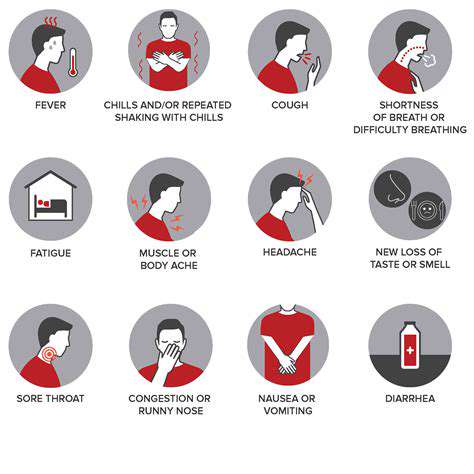Identifying Severe Symptoms: A Comprehensive Guide
Common Severe Symptoms to Watch Out For

Physical Symptoms That Require Immediate Attention
Many physical symptoms can signal a serious underlying health issue. Experiencing severe chest pain, difficulty breathing, or sudden confusion should never be ignored. These signs can be indicative of conditions such as heart attacks or strokes, both of which require urgent medical evaluation.
Another alarming symptom to be aware of is unrelenting abdominal pain, particularly when accompanied by vomiting or fever. These could suggest conditions like appendicitis or pancreatitis, both of which might necessitate surgical intervention.
Severe headaches that suddenly occur and are different from usual migraines can also indicate a serious health crisis, such as a brain hemorrhage. Never underestimate the significance of a new, unexplained headache; it is often best to seek medical advice immediately.
Additionally, if you notice any signs of infection—such as fever accompanied by a rash or severe lethargy—it’s important to visit a healthcare provider. These symptoms could signal serious infections requiring prompt treatment.
Mental and Emotional Warning Signs
Mental health is just as crucial as physical health, and certain symptoms merit immediate attention. For instance, experiencing intense feelings of hopelessness or suicidal thoughts can indicate a mental health crisis that necessitates professional help. Seeking support in these situations is pivotal for safety and recovery.
Sudden changes in mood or behavior, especially if they are out of character, can be signs of underlying mental health issues or severe stress. These changes should not be dismissed, as they could impact an individual's overall well-being.
Additionally, if a person exhibits memory loss or confusion that disrupts daily functioning, it’s essential to seek medical advice. Such symptoms could be indicative of cognitive decline or other neurological conditions.
Finally, persistent feelings of anxiety that interfere with daily activities should be taken seriously. These symptoms can be debilitating and often require professional support to navigate effectively.
When to Seek Medical Attention
Recognizing Critical Signs
When evaluating severe symptoms, it is crucial to identify critical signs that indicate a more serious health issue. Common critical signs include severe chest pain, shortness of breath, or a persistent high fever. These symptoms often require immediate attention and should not be ignored.
Other symptoms to watch for are sudden changes in vision, sudden weakness or numbness in the face, arm, or leg, particularly if it affects one side of the body. These could indicate a stroke, which is a medical emergency that requires prompt evaluation.
Additionally, if you experience uncontrollable bleeding, severe abdominal pain, or any sudden and severe headache, immediate medical attention is necessary. These symptoms can be indicative of serious conditions that need to be addressed without delay.
Always remember, it's better to err on the side of caution. If you're uncertain about the severity of your symptoms, it is advisable to seek medical care promptly.
Understanding the Severity Scale
Healthcare professionals often use a severity scale to determine how urgently a symptom needs to be addressed. Mild symptoms may not require immediate care, but severe symptoms often escalate quickly. It’s essential to understand where your symptoms fall on this scale.
For instance, mild headaches or low-grade fevers can often be treated at home, whereas severe headaches with neurological symptoms should be evaluated by a professional. The differentiation is crucial for effective treatment.
Moreover, symptoms that develop suddenly or progressively worsen over a short period may indicate an underlying serious condition. Keeping track of the onset and progression of symptoms can aid medical professionals in making an accurate diagnosis.
In summary, understanding the severity scale can empower individuals to make informed decisions about when to seek medical attention for their health concerns.
When Symptoms Persist or Change
Sometimes symptoms may begin as mild but can persist or change over time. When you notice that your symptoms are not improving or are becoming more pronounced, it’s a sign that it may be time to seek help.
For example, a cold may start with simple congestion, but if it develops into difficulty breathing or chest pain, professional medical evaluation is warranted. Persistent symptoms can indicate an underlying condition that requires treatment.
Changes in the nature of the symptoms—such as frequency, intensity, or duration—are also critical. A previously manageable headache that is now occurring daily may suggest a more serious issue that should be investigated.
It’s crucial to monitor your symptoms and to document any changes to provide useful information to healthcare professionals when you seek care.
Understanding Risk Factors
Certain individuals may have risk factors that increase the likelihood of severe symptoms. This includes individuals with pre-existing medical conditions like diabetes, heart disease, or a weakened immune system. Understanding these factors can help individuals be more vigilant about their health.
Age is another important factor; older adults may experience a different set of symptoms, or their symptoms may progress more rapidly compared to younger individuals. Being aware of these risk factors can help in recognizing when to seek care.
Family history also plays a role; if severe illnesses have affected family members, being proactive about symptom monitoring is wise. Discussing your family health history with your doctor can lead to earlier interventions.
By recognizing risk factors, individuals can be more proactive in seeking medical attention when severe symptoms arise.
Consulting with Healthcare Professionals
Knowing how and when to consult with healthcare professionals can make a significant difference in outcomes. If you are experiencing severe symptoms, contact your primary care provider or visit an urgent care facility to discuss your symptoms and concerns.
It’s essential to be prepared when you arrive for your consultation. Keeping a record of your symptoms, including onset, duration, and any other relevant medical history, will assist in the evaluation process. Being clear and concise can help clinicians make informed decisions swiftly.
In some cases, you may be advised to go directly to the emergency room, particularly if symptoms are life-threatening. Understanding what situations necessitate immediate emergency care can save valuable time.
Finally, don’t hesitate to ask questions if you’re unsure about your diagnosis or treatment options. Open communication with healthcare professionals is key to effective care and recovery.



